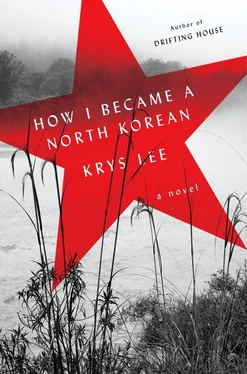“Your very first electronic piano.” Seongsik tapped at the plastic keys.
“Electronic piano,” I repeated seriously as if it were new to me, though bands in our country had played the instrument for decades.
“Credit card, sleeping bag, DVD player,” I repeated, naming the world that he said was now also mine.
“Look at this, listen to this,” he said, and slipped a round disc into yet another machine. I was shocked that everything inside the apartment seemed to require electricity, and even more shocked that electricity continued to surge reliably, the machines buzzing without pause. I was used to black nights, trains idling for days. I began to exclaim when the music silenced me.
The sound reminded me of autumn leaves, drifting currents. Nights while returning home with my goods, afraid of every man I met. There was no fear in that music. Just sadness, and beauty.
“Chopin, one of his nocturnes. Not a scary note in it,” Seongsik said. “But you’re crying. Oh, why are you crying? I must have hurt you badly!”
“No, it’s not that,” I said. “I’ve traveled so far to hear this music.”
Another kind of conversation might have happened between us then. For weren’t there those cracks in time when life suddenly reversed itself and surprised, and anything became possible? Maybe even a temporary, but real, affection between two strangers who needed each other, for now? But the bedroom door flew open and a young girl emerged from the room, her pink flesh overflowing from the armbands of her nightgown rumpled with sleep.
This girl, who shared Seongsik’s squat nose and his anxious, chewed-up lower lip, looked hungrily at him, and he scooped her up in his arms and held her high in the air.
He glowed into her pinched, radish-shaped face. “Is my favorite lady still angry at her abba ?”
That was when my baby made a whisper of a kick, my stomach flipped, and the overfed girl gave me a murderous look, then wailed, “Abba, you promised!”
The morning of the last day of my abeoji ’s life, even the streetlights in our neighborhood were blacked out. After dodging my abeoji and in this way proudly refusing the car and driver he made available to me, I walked to the tram in the dark, stopping to write a line of poetry as it came to me. I noticed things that I assumed he wouldn’t notice: the smell of burning coal and the grit of soot on my face, how some people wore the bleak dawn like a coat. How in the glass window of the trolley I looked as solemn and awkward as a contrabass, standing a head taller than everyone around me. I listened for the clang of the red and white trolley, watched the traffic girl with her blue and gold cap guide the thin weave of cars, the crumbling plaster of huts tightly packed together that hid behind a front line of apartment buildings. I heard the story of a city being constructed around me, them, all of us, making everyone a part of its story.
I walked with my eyes drawn toward the stray weed, the cigarettes a vendor sold in single units, the older woman lingering alone alongside a bare, cracked wall. Crowds of people talking reminded me of a gaggle of geese honking at one another. I’ve always been a well-disguised solitary, preferring books to people and music to socializing and playing sports. I didn’t see myself as part of any group though I was part of the many that organized our lives, shuttled from place to place in packs, as we all were.
That was how I began the last day of my abeoji ’s life: dodging encounters with the people closest to me. I arrived at the university and retreated to the back of the class, where I was forgotten, the way I wanted to be. The temperature outside was higher than in the sunless classroom, and all of us were swaddled in winter coats, warming our fingers swollen blue with cold and breathing in the air that caught like glass in our throats.
That evening I returned home from a parade drill, exhausted. For some it was a beautiful spectacle, a point of civic pride, but for me it was only another garish gathering I was forced to participate in. As I took off my shoes, I heard the traditional folk song “Arirang” playing, the kind of music that my modern parents would never listen to in private.
At first I didn’t believe what I saw. A stranger was burning photos and documents in our kitchen, standing over a flame that made his cheeks glow yellow and red. “Arirang” continued to undulate through the room. The image enchanted me and from the door I watched the material curl in the wastebasket, until my father’s and mother’s glossy faces turned to ash and I began to understand. My stomach seized up. The stranger was erasing us.
He looked so ordinary in his black wool coat and suit. He had the tidy haircut I expected for a man of his age, and his diffident air reminded me of someone in a cold office who typed up dull reports all day. I assumed he was half-alive, half-conscious in his environment, as I was, sleepwalking through the orders that had brought him into our house. He looked perplexed as he stared at the fire curling and rising, then looked up at me and pointed at the walls around us. The walls are listening, he meant. I understood immediately.
He said, “You must be back from classes,” sounding official and uninterested, unlike his eyes. He made a bowl with his hands, then pointed at the fire. “Where are your parents?”
I said, “I don’t know. Working?” I felt strangely calm, as if I were talking about another person in someone else’s house.
I trusted that if you did what you were told, you would be left alone, so I went quickly, quietly, to the cabinet and withdrew a large steel bowl, then held the bowl to the faucet and turned the water on at low force so there was no noise. I brought some cornstarch as well. He smothered the fire in the cornstarch and only then drizzled what was left with water. As we watched, a cloud of smoke rose from the charred remains.
“My parents — they… they’re coming back, yes?” I said. Had they been taken away? My head filled with thoughts and images that I hadn’t known were there: the camps farther north of us. The world suddenly much bigger, and lonelier, than I had imagined it.
“Look, you should have a seat.” The man’s voice was calm, but his hands trembled. “I’m doing a routine inspection,” he explained as his eyes danced across the room, landing everywhere but on me. We were not the kind of family used to such inspections.
I waited to discover who the man was and if he had discovered all the usual illegal possessions: shelves of Western VCDs and music, foreign novels and poetry books that were available to select students, questionable gifts that foreign diplomat friends had given my abeoji on their trips to the West, and most of all the stacks of foreign currency hidden throughout the house that I had found by accident. When I discovered the false wall built into the closet a few months ago, my mind had begun to spin, uncertain of what else I didn’t know.
“My abeoji is a loyal, powerful member of the party. There must be some mistake.” I picked my words carefully, imagining someone far away listening in. It seemed impossible that a few hours ago I had felt so safe.
“Look at this,” I said, and I led him to a letter signed by the Great General. “This is addressed to my abeoji. And you know who my eomeoni is.” Everyone knew who she was.
I anxiously showed him my abeoji ’s honors and official party photos, a party publication spread out so the Great General’s photo was uncreased and turned faceup, and the Great Leader’s and the Great General’s gleaming portraits prominently placed and dusted daily with a padded stick. All the necessary evidence of a loyal life.
Читать дальше












